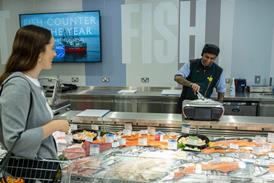
Cornish food businesses have claimed lack of government support and labour shortages have left them “stunted” post-Brexit.
Some of the biggest challenges facing the local food and drink industry are linked to staffing and skills shortages post-Brexit, as well as maintaining trade with the EU and accessing new markets outside Cornwall, a recent survey of about 50 Cornish businesses showed.
“EU labour shortages have had a massive impact,” said Louise Ellis, co-founder of food & drink network Cornwall Gateway. “Our farms relied on European workers – we’re now watching them stockpile stuff on their fields.
“I’ve never seen so much wasted crops, ahead of Christmas you could smell rotten broccoli and brussels sprouts in the fields.”
The majority of people in Cornwall (56.5%) voted to leave the EU in 2016, despite the region receiving some of the highest levels of EU structural funding in England pre-Brexit.
Cornish food producers in particular enjoyed the support of EU-funded projects such as Experts Grow, which was aimed at developing the skills of food business owners.
But many of Cornwall’s skills and employment-related EU projects are coming to an end this year, potentially leaving businesses even more at risk, Ellis said.
The UK’s Shared Prosperity Fund is the government’s attempt at “seizing the opportunities of leaving the European Union”. It will distribute funds between councils across the country so they can target areas like high-quality skills training, employment and productivity growth.
However, the amount Cornwall received from the government’s fund last year – £132m to spend over a three-year period – was significantly less than the council would have received from the EU before Brexit, which amounted to about £100m a year.
The fund was also “complicated to access” for many family businesses in Cornwall, which ended up avoiding it over concerns around the “amount of red tape” it entailed, Ellis said.
Trade body Cornish Embassy has also called for a regional training programme directed at the food & drink sector as businesses have struggled with shortages in recent years.
“If you want to train someone as a butcher, fish filleter, or in food processing or brewing skills, you have to either send them out of the county for training or bring down a training provider so that’s caused a real gap in the skills market in Cornwall,” Ellis said.
Distribution was also a key issue for Cornish businesses as rising logistics costs put an added strain on the region’s ability to connect and trade with the rest of the country, as well as with the EU.
“It’s difficult to get excited about the positives in the budget announcements when so much is missing – especially where Cornwall and Isles of Scilly are concerned,” said CEO Cornwall Chamber of Commerce CEO Kim Conchie when the spring budget was revealed last month.
“I’ve downloaded the entire budget document and searched for both ‘Cornwall’ and ‘south west’, and there’s not one mention of either – it’s as if we don’t exist.”



















No comments yet